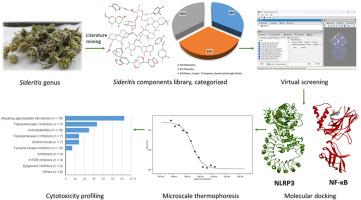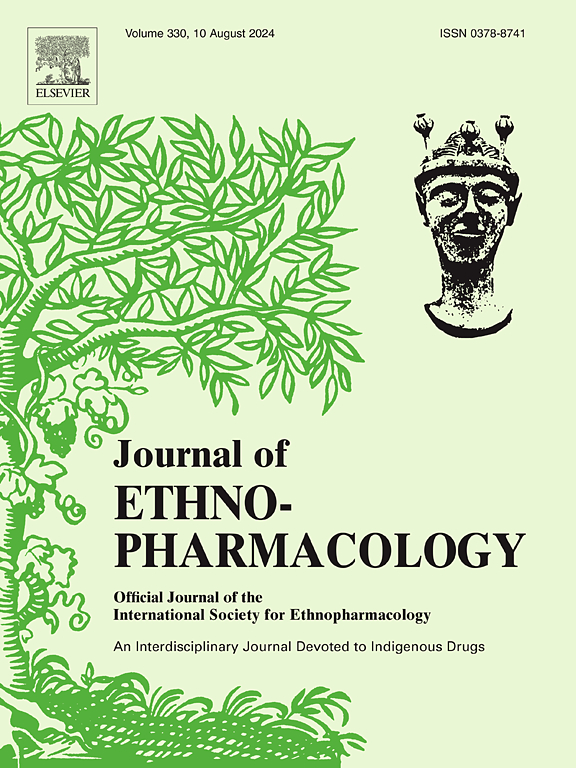Identification of anti-inflammatory and anti-cancer compounds targeting the NF-κB-NLRP3 inflammasome pathway from a phytochemical library of the Sideritis genus
IF 5.4
2区 医学
Q1 CHEMISTRY, MEDICINAL
引用次数: 0
Abstract
Ethnobotanical relevance
For centuries, the aerial parts of Sideritis species have been known for their medicinal properties as herbal teas. Although the antioxidant and anti-inflammatory properties of the genus have been widely documented, the underlying mechanisms are yet to be sufficiently clarified.
Aim of the study
We investigated the anti-inflammatory and anticancer activities of phytochemicals of the Sideritis genus.
Material and methods
Through literature mining, a chemical library containing 657 components of the Sideritis genus was formed. We studied these compounds for binding to NLRP3 and NF-κB proteins in silico by virtual drug screening and molecular docking, and in vitro by microscale thermophoresis (MST). Liquid chromatography-high-resolution mass spectrometry analysis (LC-HRMS) was performed in the Sideritis extracts. One of the identified compounds, verbascoside, was investigated for its cytotoxic activity by mining a panel of 49 tumor cell lines in the data repository of the National Cancer Institute (NCI, USA).
Results
Virtual screening and molecular docking results highlighted two compounds targeting both proteins of interest, i.e., verbascoside (acteoside) and apigenin 7,4′-bis(trans-p-coumarate), as both had lowest binding energies of less than −10 kcal/mol. Using MST, we then verified that both compounds bound to the target proteins. Verbascoside bound to NLRP3 and NF-κB with Kd values of 0.67 ± 0.18 μM and 0.01 ± 0.08 μM, while apigenin 7,4′-bis(trans-p-coumarate) had Kd values of 4.60 ± 1.66 μM and 0.27 ± 0.75 μM, respectively. Verbascoside was abundant in the Sideritis extracts, according to LC-HRMS analysis. Since inflammation is strongly related to carcinogenesis, we investigated the anticancer activity of verbascoside in the second part of this study. We investigated the activity of verbascoside in 49 tumor cell lines of the NCI. Comparing its activity with 81 standard anticancer drugs revealed numerous interactions with DNA-damaging agents (alkylators, topoisomerase I/II inhibitors, antimetabolites), indicating that verbascoside may also affect the DNA of tumor cells. We further investigated the involvement of verbascoside in several main drug resistance mechanisms, i.e., ABC transporters, oncogenes, tumor suppressors, cellular proliferation rates, and other parameters. Except for the correlation to the mutational status of NRAS, no other significant relationships were found, indicating that verbascoside is not involved in most of the common drug resistance mechanisms. Two-dimensional cluster analysis-based heatmap generation of a proteomic profile from 40 out of 3171 proteins revealed a significant correlation between the expression of these proteins in 49 tumor cell lines, and the cellular response to verbascoside. This indicates that the presence of these proteins is a determinant for sensitivity or resistance to this natural product.
Conclusion
The database established here represents a valuable resource for the screening of bioactivites of the Sideritis genus. The experimental validation of the anti-inflammatory and cytotoxic activities of selected compounds proved that virtual drug screening and molecular docking are suitable tools for the identification of putative drug candidates. Verbascoside was among the top 10 compounds binding to two key anti-inflammatory proteins, NLRP3 and NF-kB. Additionally, data from the NCI indicate that verbascoside is not linked to main drug resistance mechanisms.

从蛛网膜属植物化学文库中鉴定靶向 NF-κB-NLRP3 炎症组通路的抗炎和抗癌化合物
民族植物学意义:几个世纪以来,凫翁属植物的气生部分一直以其作为草药茶的药用特性而闻名。虽然该属植物的抗氧化和抗炎特性已被广泛记载,但其潜在机制仍有待充分阐明:研究目的:我们研究了凫翁属植物化学物质的抗炎和抗癌活性:通过文献挖掘,我们建立了一个包含 657 种梭梭菌属成分的化学库。我们通过虚拟药物筛选和分子对接对这些化合物与 NLRP3 和 NF-κB 蛋白的结合进行了研究,并通过微尺度热泳(MST)对其进行了体外研究。对梭菌提取物进行了液相色谱-高分辨质谱分析(LC-HRMS)。通过挖掘美国国家癌症研究所(NCI,美国)数据储存库中的 49 种肿瘤细胞系,对其中一种已鉴定化合物马鞭草苷的细胞毒性活性进行了研究:虚拟筛选和分子对接结果表明,有两种化合物能同时靶向两种相关蛋白,即马鞭草苷(肌动蛋白苷)和芹菜素-7,4'-双(反式-对香豆酸酯),因为这两种化合物的最低结合能均小于-10 kcal/mol。然后,我们利用 MST 验证了这两种化合物与目标蛋白质的结合。马鞭草苷与 NLRP3 和 NF-κB 的 Kd 值分别为 0.67 ± 0.18 μM 和 0.01 ± 0.08 μM,而芹菜素 7,4'-双(反式-对香豆酸酯)的 Kd 值分别为 4.60 ± 1.66 μM 和 0.27 ± 0.75 μM。根据 LC-HRMS 分析,蛛网膜炎提取物中含有丰富的马鞭草甙。由于炎症与癌变密切相关,我们在本研究的第二部分对马鞭草苷的抗癌活性进行了研究。我们研究了马鞭草苷在 NCI 49 种肿瘤细胞系中的活性。将其活性与 81 种标准抗癌药物进行比较后发现,马鞭草苷与 DNA 破坏剂(烷化剂、拓扑异构酶 I/II 抑制剂、抗代谢物)之间存在许多相互作用,这表明马鞭草苷也可能影响肿瘤细胞的 DNA。我们进一步研究了马鞭草苷参与几种主要耐药机制的情况,即ABC转运体、癌基因、肿瘤抑制因子、细胞增殖率和其他参数。除与 NRAS 突变状态相关外,未发现其他显著关系,表明马鞭草苷未参与大多数常见的耐药机制。基于二维聚类分析的热图生成蛋白质组图谱,从 3171 个蛋白质中筛选出 40 个,发现这些蛋白质在 49 种肿瘤细胞系中的表达与细胞对马鞭草苷的反应之间存在显著相关性。这表明,这些蛋白质的存在决定了对这种天然产品的敏感性或抗性:本文建立的数据库是筛选蛛网膜属生物活性物质的宝贵资源。对所选化合物抗炎和细胞毒性活性的实验验证证明,虚拟药物筛选和分子对接是鉴定候选药物的合适工具。马鞭草苷是与 NLRP3 和 NF-kB 这两种关键抗炎蛋白结合的前 10 种化合物之一。此外,NCI 的数据表明,马鞭草苷与主要的耐药机制无关。
本文章由计算机程序翻译,如有差异,请以英文原文为准。
求助全文
约1分钟内获得全文
求助全文
来源期刊

Journal of ethnopharmacology
医学-全科医学与补充医学
CiteScore
10.30
自引率
5.60%
发文量
967
审稿时长
77 days
期刊介绍:
The Journal of Ethnopharmacology is dedicated to the exchange of information and understandings about people''s use of plants, fungi, animals, microorganisms and minerals and their biological and pharmacological effects based on the principles established through international conventions. Early people confronted with illness and disease, discovered a wealth of useful therapeutic agents in the plant and animal kingdoms. The empirical knowledge of these medicinal substances and their toxic potential was passed on by oral tradition and sometimes recorded in herbals and other texts on materia medica. Many valuable drugs of today (e.g., atropine, ephedrine, tubocurarine, digoxin, reserpine) came into use through the study of indigenous remedies. Chemists continue to use plant-derived drugs (e.g., morphine, taxol, physostigmine, quinidine, emetine) as prototypes in their attempts to develop more effective and less toxic medicinals.
 求助内容:
求助内容: 应助结果提醒方式:
应助结果提醒方式:


